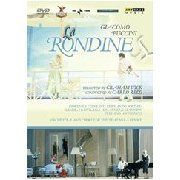Puccini said that he wanted his 1917 La rondine to be seen as “a reaction to the repulsive music of today, to world war music.” Well, I’m not certain that it functions as a balm to assaulted ears, but a really good performance of it can convince us of its charms, as does the CD-only version on EMI with Angela Gheorghiu’s expressive, complex Magda (certainly better than Kiri Te Kanawa’s mellifluous but dull version on Sony) and Roberto Alagna’s impulsive, young-sounding Ruggero. (Anna Moffo is lovely on a 1966 RCA recording as well.) This DVD does not do the work justice.
When the opera was first heard at the Met in 1928, critic W.J. Henderson called it “the afternoon off of a genius” and “just a vivacious, high-class musical play mingling humor, farce, tender emotions, and show in delectable proportions.” I tend to agree with him, and not in a good way–I find the work (and the characters) shallow.
The simple plot concerns the aging courtesan, Magda, who, tired of her loveless but materially worthwhile relationship with Rambaldo, goes to a nightclub and there meets and falls in love with a young student, Ruggero, who, knowing nothing of her past, falls even harder for her. They run away, Traviata-style, but when he proposes marriage and a meeting with his mother, Magda realizes that she cannot play with his life. She tells him who she really is and races out to return to her old ways, leaving him brokenhearted. The sentimentality of this plotline is cut through by a somewhat comic pair, the poet Prunier and the perky maid Lisette.
The opera manages to fail on two levels: It isn’t quite an operetta due to its veristic love scenes and sad denouement; and its lighter moments seem plugged into the otherwise sad situation. Nonetheless, Magda’s ravishing aria, “Chi il bel sogno di Doretta”, is quite rightly famous, a quartet in Act 2 featuring all four principals impresses, and the sad, lengthy final duet can cause a lump in the throat or a tear in the eye.
In this production from Venice’s La Fenice, director Graham Vick has updated the action from the mid-19th century to the mid-20th while happily keeping it in Paris. It does the opera no harm. Peter J. Davison’s sets and Sue Wilmington’s costumes are lush and handsome: the elegant duplex apartment of the first act, all in glass, chrome, and blues, complete with grand piano, contrasts well with the garish nightclub of Act 2, neon-lit, with motor-scooters coming and going, and a hot dog-vending van, although you might wonder if this really is a student hangout. Men are in dinner jackets and women sport full skirts and/or off-the-shoulder dresses.
The third act is set at a seaside terrace with huge umbrellas and deck chairs–the picture of sunny joy, ironically placed for the story’s sad ending. Vick asks too much of his leading soprano and tenor; they spend far too much time on the floor looking as if they’re having fun. It’s forced and awkward. He handles the crowds with aplomb, however.
The world probably could use a good DVD version of this opera (it has its fans), but this isn’t it. Like the opera or not, approve of the updating or not, the singing in this set is too uneven to enjoy. I’m still having trouble understanding Fiorenza Cedolins’ career. The sheer quality of her voice may not be open to argument, but her Magda, particularly in the first act (which is where her big aria is heard), is unappealingly sung and acted, the voice not-quite-under-control. (Her Tosca struck me just the same way–a fine if unlovely voice, incorrectly tamed.) She gets better as the opera progresses, and her duets with the physically awkward but expressive Ruggero of Fernando Portari are rather nice, if not up to international standards. Emanuele Giannino sings the poet Prunier with great character, and acts the arch-sophisticate well, while Sandra Pastrani’s Lisette is prettily sung and coyly acted. Stefano Antonucci, in the unfortunate role of the un-loved Rambaldo, supplies the show’s best singing.
Carlo Rizzi’s leadership could pass for good, provided you’re not familiar with Antonio Pappano’s on the EMI recording; Rizzi goes for sheer sentiment while Pappano is aware that Fanciulla was seven years old and Tabarro was just around the corner. In other words, Pappano brings out everything interesting in the score and Rizzi plays it prettily and like a poor man’s Léhar. Picture and sound (three formats) are excellent; subtitles are included in all major European languages.
There is another DVD of this opera (Hardy)–a black-and-white film from 1958–with Rosanna Carteri and Giuseppe Gismondo that I’m willing to bet is better than this one, but I’ll stick with EMI for the time being.
































